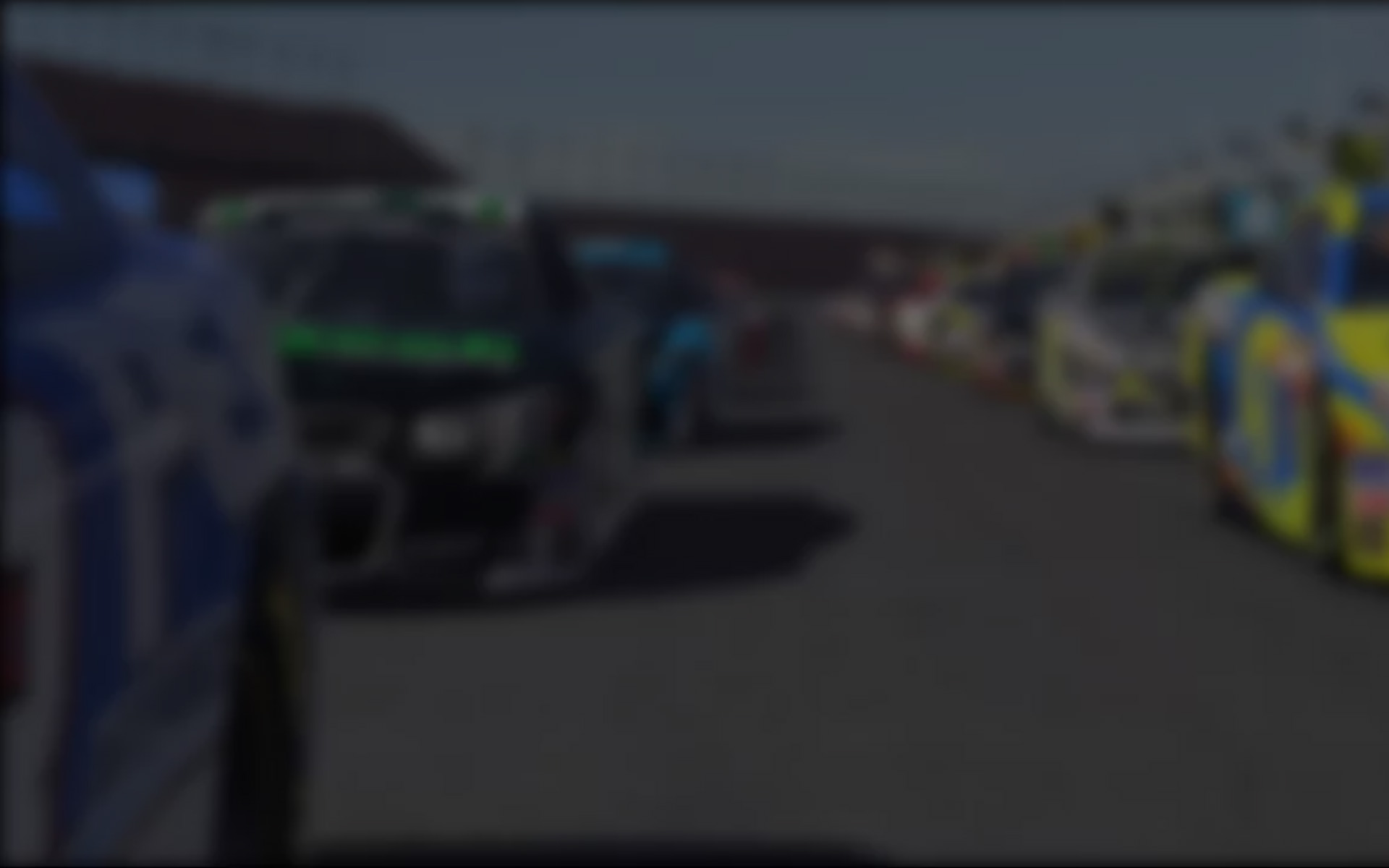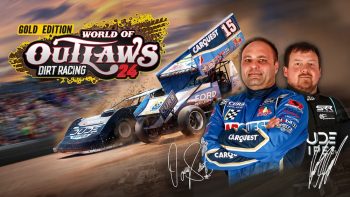
iRacing: Music to Florian Godard’s Ears
June 9th, 2010 by DavidP
Florian Godard lives life in the allegro lane. A world-class double bassist in the Orchestre d’Ile de France, Godard is one of just five sim racers regularly competing in both the NASCAR iRacing.com World Championship Series (NiWCS) and the iRacing Drivers World Championship Road Racing (iDWCRR). But beautiful music and fast cars have long been vital components of Godard’s life.

Florian Godard of the Orchestre National d'Ile de France . . . and iRacing.com.
Now living near Paris, Godard grew-up in a musical family. His mother is a pianist and singer, his father plays the accordion and guitar. So it was only natural, predictable even, for Florian to begin making music at an early age. He began playing the piano as a toddler and was composing music inspired by his favorite video games on his father’s synthesizer by age eight.
“I was in love with some music of these games,” Godard says. “For example, Ridge Racer, with its crazy speed music, or a combat flying simulation – I think it was called Ace Combat — with a fantastic rock-metal music.
“Today when I listen to my first compositions, it’s strange. There is a good direction in the music, but I really feel the lack of technical knowledge. Still, sometimes with my piano or guitar I play some of my old themes; I like to improvise to give them a new sense.”
At the same time he began racing radio-controlled cars and, eventually, gave karting a try. Although his karting career was destined neither for greatness nor longevity, Godard developed into a top level R/C racer.
“My dad was a great R/C driver and regularly raced in national events,” Godard recalls. “When I was five years old, I got my first R/C car and I really loved that.
“I did a lot of 1/24 scale electric racing on indoor short tracks. These cars are insane…fast and intense; it requires a lot of reflexes. With these ‘mini’ cars and, after, with 1/28 scale I won many races and sometimes finished ahead of French, European and World Champions Adrien Bertin or Guillaume Vray.”
Godard later progressed to the Tamiya Cup where he twice qualified for the European championship and twice finished just off the podium, in fourth. He also finished second in the Coupe de France with a 1/8 scale nitro car and won the French road racing championship in the 1/5 scale nitro class. Yet it was the off-road competition he most enjoyed.
“I really like the feeling of off-road competition,” he says. “These cars are very fun to drive, we have to manage the risk and it’s difficult to break away from your competitors. But I liked too the precision, the importance of setup and also the adrenaline of the road competitions. For me the road side of iRacing is similar to these competitions, whereas I can compare the oval side to off-road side of R/C cars. You have to be fast but patient and manage your position on the track. Plus the races are long and anything can happen.”
What did happen is that Godard abruptly gave-up his R/C hobby – along with just about everything else – to pursue his true calling. After completing his public education, Godard studied music for two years before entering a four year program at the Conservatoire Supérieur National de Paris.
“It’s really hard to find a job in music,” he says. “There are frequently 100 entries for one ‘chair’ in an orchestra. To have the best chance for success, I decided to stop everything (R/C cars, piano, composition . . . and even girls!) that was not essential to my music. I was only studying and practicing on my double bass, eight hours per day.”
Florian gave-up r/c cars (and nearly everything else) for his studies.
Godard’s commitment paid huge dividends. While studying at the Conservatoire Supérieur National de Paris, he played with Orchestre National de l’Opéra de Paris, an experience he describes as “awesome… It was very impressive to play Wagner pieces, like “Tristan & Isolde,” really a monument of the musical world… five hours and 30 minutes duration, with pauses. That’s more than a NASCAR race!”
And in his second year of studied he joined the Orchestre National d’Ile de France, a development that “changed (his) life.”
Although Godard loves classical music, what he enjoys most about his association with the Orchestre National d’Ile de France is playing that music to people who might not otherwise have the opportunity to experience it.
“This is one of the best French orchestras,” he says. “We play throughout France and in Europe but, for the most part, our work is to play around Paris; nearly 100 performances a year. I love classic music, but what I really appreciate in this orchestra is to go in front of the general public; we have to bring classical music far from Paris.”
In addition to performing, Godard also teaches piano and double bass, transcribes sheet music and is again composing. (Visit his website www.transcriptions.1s.fr) And he’s also back to another of his passions: racing. Only now he’s racing virtual cars online rather than R/C cars.
Godard was introduced to sim racing via rFactor . . . and returned the many favors he owed his father by getting him hooked on the French FFSCA league. When iRacing was introduced to the public in 2008, Godard was among its earliest subscribers.
“I have no problems with rFactor, it’s an excellent game,” he says. “But iRacing offers the ability to race during the day, in a global competition, that was really what I was looking for because I cannot be there on the evening every week and I cannot follow a complete championship. It’s a pleasure to race when we want.”
Of course, there are times when Godard has to race to an arbitrary timeframe, namely the set schedules of the NiWCS and iDWCRR. While Godard freely admits he is no threat to the Greger Huttus and Richard Towlers of sim racing, the fact that he qualified for both series is impressive. Indeed he counts that as one his most memorable sim racing achievements . . . but not THE most memorable.
I’m really happy to be able to participate in the two most prestigious series in iRacing,” he says. “The only difficult thing is the time slot for the NiWCS for Europeans. The races start at 3 am and sometimes finish at 5:45 am. I have a thought for Richard Towler from England . . . to be leading the championship with these constraints is a big performance!
“But for me, I keep in my memory my championship title in Road Legend racing after an intense fight with Richard Crozier and Milos Milkovitch in every race. I got first place in the championship by only a few points in the last race of the season.”
Although racing virtual Impala SS COTs and Dallara Indy cars would seem a world away from the double bass, Wagner and “Tristan & Isolde,” Godard experiences many similarities.
The concentration is the same in a critical moment in a performance (as in a sim race),” Florian says. “I feel adrenaline, I can listen my heart doing boom, boom . . .
“On the (iDWCRR), with 34 drivers on track we know that a crash can happen in the first lap. We have maximum one second to see ahead and make the good decision and we are sometimes two or three wide in the first lap. It’s awesome to see everybody’s skills.
“In the oval side, the start is a critical moment for me, because I’ve not enough time to train during the week. It’s hard to qualify, to be in the 37 drivers, and I must focus a lot to just make the cut, so I don’t have time to see how the car reacts in traffic and close racing. In two races I started side-by-side with Dale (Earnhardt) Jr. and I was really stressed. I don’t want to make a mistake with these drivers fighting for the championship.”
Florian with his first and biggest fan . . . his mom.
But it’s not just the adrenalin and the stress of competing with the world’s top sim racers (not to mention at least one of the very best real world racers). Godard sees parallels between his mental approach to music and racing.
“One important thing is the ability to analyze yourself,” he says. “In musical studies, we have only one hour per week with our teacher. The rest of time, we work alone. We have to know what we are doing; we have to be our own teacher. To be fast on track, it’s the same thing. We have to focus on what we can improve — and analyze ourselves — every time. I think that’s a good part of the explanation why some drivers are faster than others.”
With music and racing "one important thing is the ability to analyze yourself."
As if being a professional musician and one of the world’s 100 best sim racers is not enough, Godard is applying himself to another endeavour that synthesizes his artistic talents and technical skills. In the past year he has produced some truly compelling iRacing videos set to, of course, a veritable cornucopia of music.
“I had no previous experience making videos,” he explains. “In the beginning there were not a lot of videos about iRacing. I did my first videos to show iRacing to friends and, later, showed hot-laps because there were not many videos or tutorials about it. Then I began showing races because people who are not familiar with iRacing cannot see or even imagine just how accurate it is.”
Godard is typically modest in his assessment of his video talents.
“The video editing is easy compared to music,” he says. “It takes a lot of time, but it is a pleasure to make something better and better, every time. I’m really happy to work with iRacing for the NASCAR sanctioned series. I do my best race after race, I’m thinking all the time ‘What could be improved? What could be added?’”
There’s certainly not much more we can (or would) add, other than to say that iRacing is indeed fortunate to count Florian Godard — world class musician, sim-racer and budding videographer – among its members.
Editor’s note: Here is a taste or two of Florian Godard’s video artistry. Enjoy!















































